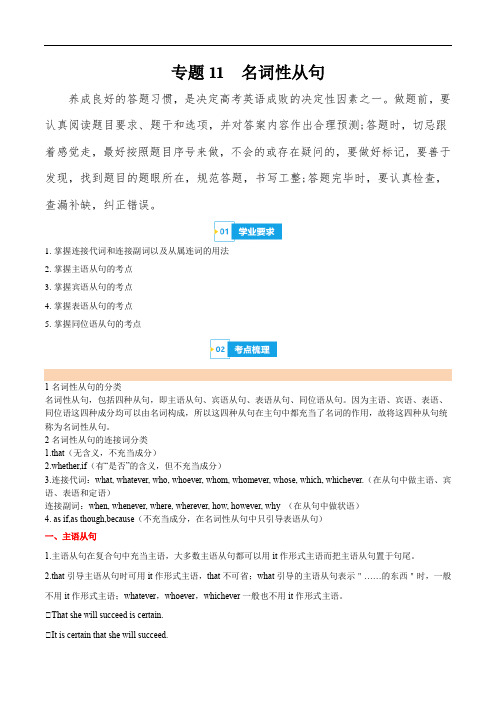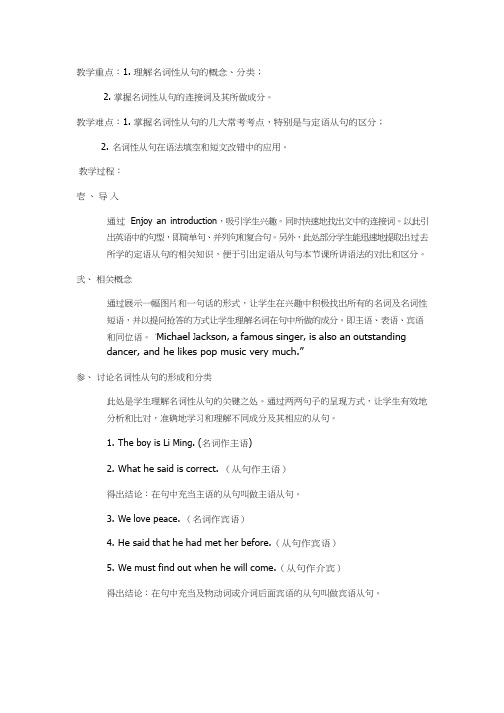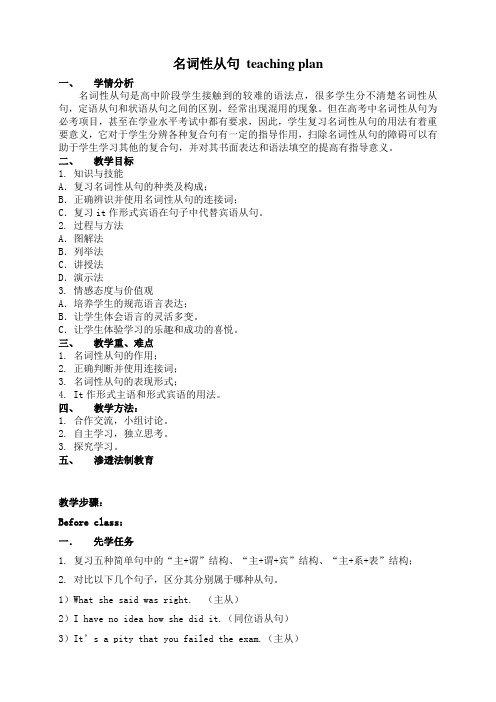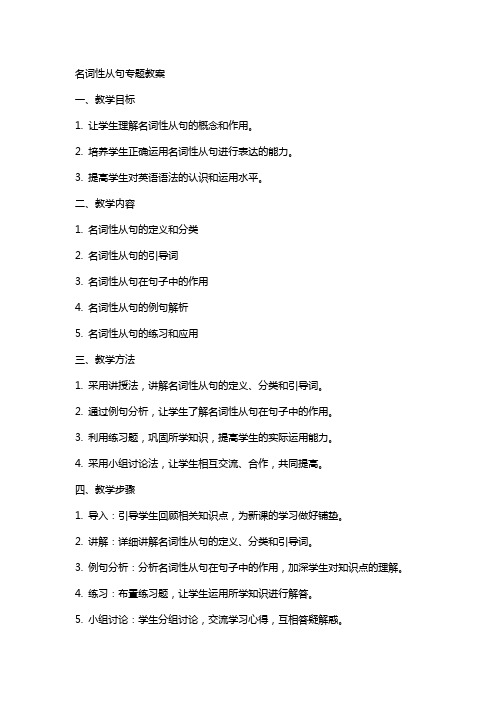高考英语 专题十一 名词性从句精品学案
英语高考名词性从句复习精品导学案

2016年英语高考名词性从句复习精品导学案-CAL-FENGHAI-(2020YEAR-YICAI)_JINGBIAN名词性从句学习目标:1. 学习名词性从句的基本用法,并学会在具体情境中对连接词的运用;掌握名词性从句与其他从句的区别;学会巧用名词性从句增强作文色彩。
2. 通过自主学习和小组合作,尝试发现式方法去学习掌握名词性从句的用法。
3. 探索规律,发现语言的理性魅力,体验英语语言内涵,激发学习英语的自信心和兴趣。
【晨读美文】Charles DickensCharles Dickens (1812-1870) was born in London. His father was put in prison because he could not pay his bills, and two days after his 13th birthday, Dickens started work in a factory, experiencing real poverty. As a young man, he worked for newspapers and as a political journalis t, he met all kinds of people. Using all these experiences, Dickens started writing novels in his early thirties and became successful almost immediately.Oliver Twist, his second novel, which was published in 1838, was hugely successful. It told the story of a young orphan alone in the dangerous streets of London. The story ends happily ---the young boy discovers who his real parents are and finds a loving home. However, it brought child poverty to the attention of the public, and for this reaso n alone it is a very important novel.Over the next 25 years, he wrote a large number of popular novels that are still read today. Dickens often wrote about the problems of poor people, and as a result of his work, the lives of the poor were improved.It is generally believed that he died of a heart attack as a result of his excitement while reading the final part of Oliver Twist. (P 336 《高中英语晨读晚诵》)预习案Task 1.欣赏歌曲《as long as you love me》,体验从句的美感:Task 2. 根据下面句子对比,总结名词性从句的用法。
名词性从句学案(优)

名词性从句复习学案班级_____________组别_________________姓名__________________【自主学习,明确目标】1.教学目标:1)了解名词性从句的定义、种类,及其位置。
2)掌握名词性从句的语序,引导词的选择及其技巧。
2.教学重点:熟记that,whether,if,what,which等引导词的特殊用法。
从1确定是什么从句。
2).分析从句的句子成分,缺什么,补什么;不缺句子成分,不缺意思,就选_______;不缺句子成分,只缺“是否”,就选__________或if;缺主语/宾语/表语,就补连接______词,选what,who,whom,which等;缺状语,就补连接_________词,选when,where,why,how 等。
3).确定词性后,再根据句子的意思选择适当的引导词。
我的问题:(你在预习中有哪些未能解决的问题和有疑问的地方?写在下面做个备忘吧!等待课堂上与老师和同学他就讨论解决。
)【合作探究,解决问题】探究一:观察句子,找出主句谓语,划出从句,判断从句类型。
1.Whoevercomesiswelcome.(____________从句)2.Itis?reported?that?three?people?were?killed?in?the?traffic?accidentyesterday.(___________从句)3.Thequestioniswhetherthefilmisworthseeing.(____________从句)4.Iwonderedwhyyouweresoangry.(____________从句)5.Italldependsonhowwesolvetheproblem.(____________从句)6.Ithinkitnecessarythatweshoulddoourhomework.(_____________从句)2.。
高中英语新人教版精品教案《名词性从句教学设计》

名词性从句的教学设计一、学情分析教学对象为高中二年级学生。
学生已经进行了高中英语一年的学习,渐渐习惯了我的教法。
他们会对课堂内容提出自己的疑惑和勇于阐述见解,并且从课内知识拓展到课外,通过多种渠道获取学习资源。
不过,本班学生的水平参差不齐,有些差距还相当大。
因此在教学过程中,布置的任务要兼顾各个层次的学生,使他们都有所收获。
二、教材分析这是名词性从句语法课的第一次系统的学习,尽管之前在课本中已经让学生对名词性从句有了初步的理解,可是如何将已学的知识进行总结、归纳,找出其内在联系,找出其规律,并在此根底上去扩展知识、指导实践,从而使学生对知识掌握得更加牢固更加深刻是我这节课的重点。
我的目标是根据学生水平和教学设计进行整合或增减,让不同层次的学生在课堂上都有所收获。
三、教学目标Enabe the tudent grae a thic fog in the afternoon2 She wondered if the bue woud ti be running3 The truth i that the fog i too thic for the bu to run that far4 She ened that he wa being watched b a ta man ina dar coat5 When we wi tart i not cear6 I had no idea that ou were her friendStee or not i unimeaid that he i writing a torou te me when wi he arrivecan begin to ee wh doe Engih have uch trange rue〔有了上一个步骤的铺垫,我顺利的完成了这个环节,学生也比拟容易的记住了这些在写作中容易犯的错误。
〕Stee to viit China again2 The hoe to viit China againfact that he wor hard i we nown to u a4 I can't tand the terribe noie that he i cring oud〔到这个环节的时候时剩下的不多,所以,我选择了只让学生初步了解它们之间的不同,打算在下一节课中再让学生进行稳固练习,并且运用。
高中英语学业水平考试必备考点归纳与测试:专题11 名词性从句(知识梳理+考点精讲精练)(原卷版)

专题11 名词性从句养成良好的答题习惯,是决定高考英语成败的决定性因素之一。
做题前,要认真阅读题目要求、题干和选项,并对答案内容作出合理预测;答题时,切忌跟着感觉走,最好按照题目序号来做,不会的或存在疑问的,要做好标记,要善于发现,找到题目的题眼所在,规范答题,书写工整;答题完毕时,要认真检查,查漏补缺,纠正错误。
1.掌握连接代词和连接副词以及从属连词的用法2.掌握主语从句的考点3.掌握宾语从句的考点4.掌握表语从句的考点5.掌握同位语从句的考点1名词性从句的分类名词性从句,包括四种从句,即主语从句、宾语从句、表语从句、同位语从句。
因为主语、宾语、表语、同位语这四种成分均可以由名词构成,所以这四种从句在主句中都充当了名词的作用,故将这四种从句统称为名词性从句。
2名词性从句的连接词分类1.that(无含义,不充当成分)2.whether,if(有“是否”的含义,但不充当成分)3.连接代词:what, whatever, who, whoever, whom, whomever, whose, which, whichever.(在从句中做主语、宾语、表语和定语)连接副词:when, whenever, where, wherever, how, however, why (在从句中做状语)4. as if,as though,because(不充当成分,在名词性从句中只引导表语从句)一、主语从句1.主语从句在复合句中充当主语,大多数主语从句都可以用it作形式主语而把主语从句置于句尾。
2.that引导主语从句时可用it作形式主语,that不可省;what引导的主语从句表示"……的东西"时,一般不用it作形式主语;whatever,whoever,whichever一般也不用it作形式主语。
☞That she will succeed is certain.☞It is certain that she will succeed.注意:(1)在"It is necessary/important/strange/natural...+that从句"结构中,从句谓语常用"(should+)动词原形"形式。
高中英语《Noun clauses名词性从句》优质课教案、教学设计

教学重点:1. 理解名词性从句的概念、分类;2. 掌握名词性从句的连接词及其所做成分。
教学难点:1. 掌握名词性从句的几大常考考点,特别是与定语从句的区分;2.名词性从句在语法填空和短文改错中的应用。
教学过程:壱、导入通过Enjoy an introduction,吸引学生兴趣。
同时快速地找出文中的连接词。
以此引出英语中的句型,即简单句、并列句和复合句。
另外,此处部分学生能迅速地提取出过去所学的定语从句的相关知识,便于引出定语从句与本节课所讲语法的对比和区分。
弐、相关概念通过展示一幅图片和一句话的形式,让学生在兴趣中积极找出所有的名词及名词性短语,并以提问抢答的方式让学生理解名词在句中所做的成分。
即主语、表语、宾语和同位语。
“M i c h ae l J a c ks o n,a fam o u s s i ng e r,i s a l s o a n o u tsta nd i ngdancer, and he likes pop music very much.”参、讨论名词性从句的形成和分类此处是学生理解名词性从句的关键之处。
通过两两句子的呈现方式,让学生有效地分析和比对,准确地学习和理解不同成分及其相应的从句。
1.The boy is Li Ming. (名词作主语)2.What he said is correct. (从句作主语)得出结论:在句中充当主语的从句叫做主语从句。
3.We love peace. (名词作宾语)4.He said that he had met her before.(从句作宾语)5.We must find out when he will come.(从句作介宾)得出结论:在句中充当及物动词或介词后面宾语的从句叫做宾语从句。
6.You are a student. (名词作表语)7.The fact is that she never knew the secret.(从句作表语)得出结论:在句中充当表语的从句(即放在系动词后面)叫做表语从句。
名词性从句讲解学案(高二用

名词性从句讲解学案(高二用)一、学习内容概览1、名词性从句的分类2、各名词性从句详解3、定语从句语同位语从句的使用区分二、内容精讲一)定义在复合句中具有名词性质并作主语或宾语或表语或同位语的从句,叫名词性从句。
因此,我们把主语从句、宾语从句、表语从句和同位语从句这四种从句统称为名词性从句。
二)引导名词性从句的关联词:1.从属连词:that , if ,whether1) that本身没有意义,在从句中不做任何句子成分。
引导单个宾语从句时,that可以__________。
但引导主语从句、表语从句、同位语从句、形式宾语it并存的宾语从句时,that___________。
如果引导两个或两个以上宾语从句,第一个that____________,从第二个宾语从句起向后的从句中的that____________。
E.g. I don’t think that she is coming.It was not wise that you quarreled with you classmate.The reason is that he is careless.The news that our team won the match inspired us.I don’t think it necessary that you should read English aloud.He told me that his father had died and that he had to live alone.2) whether 和if都表示“是否”,在从句中不担当句子成分。
引导宾语从句时(动词后面的宾语从句)二者可以换用I wonder if / whether I can get some advice from you.Ask him whether / if he can come.但在下列情况下,whether 和if 不能换用:①__________ she will come or not is still a question.The question is __________ it is worth doing.None of them can answer the question ____________ it is worth doing.It all depends on ____________ they will do their best.②_________it is true or not, I can’t tell.③__________ I don’t know _____________ to accept or refuse.④Let me know ____________ you can come or not.2 .连接代词:who , whom, what , which , whose 及whoever, whomever, whatever, whichever, whosever既保留原意,又在从句中担当句子成分。
高中英语-名词性从句-教案

名词性从句teaching plan一、学情分析名词性从句是高中阶段学生接触到的较难的语法点,很多学生分不清楚名词性从句,定语从句和状语从句之间的区别,经常出现混用的现象。
但在高考中名词性从句为必考项目,甚至在学业水平考试中都有要求,因此,学生复习名词性从句的用法有着重要意义,它对于学生分辨各种复合句有一定的指导作用,扫除名词性从句的障碍可以有助于学生学习其他的复合句,并对其书面表达和语法填空的提高有指导意义。
二、教学目标1.知识与技能A.复习名词性从句的种类及构成;B.正确辨识并使用名词性从句的连接词;C.复习it作形式宾语在句子中代替宾语从句。
2. 过程与方法A.图解法B.列举法C.讲授法D.演示法3. 情感态度与价值观A.培养学生的规范语言表达;B.让学生体会语言的灵活多变。
C.让学生体验学习的乐趣和成功的喜悦。
三、教学重、难点1.名词性从句的作用;2.正确判断并使用连接词;3.名词性从句的表现形式;4.It作形式主语和形式宾语的用法。
四、教学方法:1.合作交流,小组讨论。
2.自主学习,独立思考。
3.探究学习。
五、渗透法制教育教学步骤:Before class:一.先学任务1.复习五种简单句中的“主+谓”结构、“主+谓+宾”结构、“主+系+表”结构;2.对比以下几个句子,区分其分别属于哪种从句。
1)What she said was right. (主从)2)I have no idea how she did it.(同位语从句)3)It’s a pity that you failed the exam.(主从)4)I’m sure that I will see you again.(宾从)5)What I want to know is when we’ll leave for Beijing.(主从、表从)6)Teachers consider it necessary that students should finish their homework.(宾从)3. 用适当的连接代词或连接副词填空。
名词性从句专题教案

名词性从句专题教案一、教学目标1. 让学生理解名词性从句的概念和作用。
2. 培养学生正确运用名词性从句进行表达的能力。
3. 提高学生对英语语法的认识和运用水平。
二、教学内容1. 名词性从句的定义和分类2. 名词性从句的引导词3. 名词性从句在句子中的作用4. 名词性从句的例句解析5. 名词性从句的练习和应用三、教学方法1. 采用讲授法,讲解名词性从句的定义、分类和引导词。
2. 通过例句分析,让学生了解名词性从句在句子中的作用。
3. 利用练习题,巩固所学知识,提高学生的实际运用能力。
4. 采用小组讨论法,让学生相互交流、合作,共同提高。
四、教学步骤1. 导入:引导学生回顾相关知识点,为新课的学习做好铺垫。
2. 讲解:详细讲解名词性从句的定义、分类和引导词。
3. 例句分析:分析名词性从句在句子中的作用,加深学生对知识点的理解。
4. 练习:布置练习题,让学生运用所学知识进行解答。
5. 小组讨论:学生分组讨论,交流学习心得,互相答疑解惑。
6. 总结:对本节课的内容进行归纳总结,强调重点和难点。
五、课后作业1. 复习本节课所学内容,整理笔记。
2. 完成课后练习题,巩固所学知识。
3. 搜集名词性从句的实际应用例句,进行分析和总结。
六、教学评估1. 课堂问答:通过提问,了解学生对名词性从句的理解程度。
2. 练习题:批改学生完成的练习题,检查他们对知识的掌握情况。
3. 小组讨论:观察学生在小组讨论中的表现,了解他们的合作能力和交流技巧。
七、教学拓展1. 对比分析:让学生区分名词性从句和其他相关语法现象,如定语从句、状语从句等。
2. 实战演练:让学生运用所学知识,修改或创作句子,提高实际运用能力。
3. 课外阅读:推荐相关阅读材料,扩大学生的语法知识视野。
八、教学反馈1. 学生反馈:收集学生对课堂内容的意见和建议,以便改进教学方法。
2. 家长反馈:与家长沟通,了解学生在家的学习情况,加强家校合作。
3. 自我反思:教师课后对自己的教学进行反思,找出不足之处,不断提高教学质量。
- 1、下载文档前请自行甄别文档内容的完整性,平台不提供额外的编辑、内容补充、找答案等附加服务。
- 2、"仅部分预览"的文档,不可在线预览部分如存在完整性等问题,可反馈申请退款(可完整预览的文档不适用该条件!)。
- 3、如文档侵犯您的权益,请联系客服反馈,我们会尽快为您处理(人工客服工作时间:9:00-18:30)。
高考英语专题十一名词性从句精品学案名词性从句一直备受高考命题者的关注,近几年来的高考题主要考查在具体语境中连接词的选择,尤其是连接词what和that的辨析,以及whether 与if表示“是否”时的区别。
因此,正确区分名词性从句的类型,根据在从句中的作用和所表达的意义,确定恰当的连接词是一轮复习的重点。
此外,名词性从句和定语从句的辨析,也是高考考查的重点。
一、认识各种名词性从句名词性从句相当于名词,可分别作句子的主语、表语、宾语和同位语。
因此,名词性从句具体分为主语从句、表语从句、宾语从句和同位语从句。
名词性从句中的连接词有连词that / whether / if,连接代词what / who(m)/ which / whose / whatever / whoever / whomever / whichever,连接副词where / when / why / how 。
从名词性从句在句中所起的作用来说,名词性从句是句子不可缺少的一部分,和句子的其他成分之间也不会用逗号隔开。
而定语从句和状语从句是句子中的修饰成分,去掉之后不会影响句子主体结构的完整性。
这是判断是否是名词性从句最主要的特征。
如:I wonder how much these shoes cost. (宾语从句,不可省去)He is the very man I look after. (定语从句,修饰the man)You may borrow the book as long as you keep it clean. (状语从句)1.主语从句Who will go is not important.It doesn't matter so much whether you will come or not. (形式主语it代替后面的真正的主语从句)注意:that引导主语从句放于句首时,不能省略。
That he suddenly fell ill last week made us surprised.2.表语从句The question was who could go there.My idea is that we can get more people to help in the work.That is why the brothers wanted to make a bet.It looked as if it was going to rain.3 . 宾语从句I hope (that) everything is all right.注意:(1)that在引导宾语从句时,常可省略,但如果有两个以上的宾语从句时,最后一个从句的that不能省略。
如:I know (that) he has just graduated from college and that he is looking for a job.(2) 如果动词宾语后又有补语,那么要使用it作形式宾语,然后把宾语从句放在补语之后。
如:I make it known that we'll be invited to the ball.(3) 如果主句的谓语动词的时态是一般过去时,那么从句的时态要采用相应的与过去有关的时态,但如果从句描述的是客观事实,从句时态不可调整“呼应”。
如:She remembered that she had left her wallet at the school gate.Our teacher said that light travels faster than sound.4.同位语从句同位语从句在句中作某一名词的同位语,一般位于该名词(如:news, fact, idea, suggestion, promise等)之后,说明该名词的具体内容。
如:I have no idea when he will be back.The fact that he had not said anything surprised everybody.注意:在动词:一坚持(insist)、二命令(order,command)、三建议(suggest,advise,recommend)、四要求(demand,require,request,ask)后的宾语从句和这些动词的过去分词后的主语从句,以及这些动词的名词引出的表语从句和同位语从句中,谓语部分常用(should)do形式。
如:He insisted that he (should) try once again.His advice is that everyone (should) do his best to help the poor girl.It is required that students (should) attend at least 90% of the lectures.二、名词性从句的连接词名词性从句的连接词是名词性从句中最核心的问题,也是高考的常考点。
连接词的选择要考虑它在从句中的作用和所表达的意义。
1. what与that(1) 【误】 All what he did was for you.【正】 What he did was for you.【正】 All that he did was for you.(2) 【误】 I was thinking that I could do for you.【正】 I was thinking what I could do for you.【解析】 what引导名词性从句,what相当于the thing that/ the …that/ all t hat 等,具体的意义要根据上下文确定。
在名词性从句中,what既有意义,又在从句中作一定的成分,而that无意义,且在从句中不作成分。
2. who与 whoever【误】 Who is the first to come will get a gift.【正】 Whoever is the first to come will get a gift.【正】 Anyone who is the first to come will get a gift.【解析】 whoever引导名词性从句,意为“无论谁”,相当于anyone who;而who意为“谁”。
3. whether与if(1) 【误】 They don't know if to go there.【正】 They don't know whether to go there.(2) 【误】 It depends on if we have enough time.【正】 It depends on whether we have enough time.【解析】在以下情况只能用whether不能用if:①作介词宾语时,连接词一般用whether。
It all depends on whether they will come back.②后面直接跟or not 时,用whether。
I didn't know whether or not he had arrived in Wuhan.③主语从句、表语从句和同位语从句中,只能用whether。
Whether the meeting will be put off has not been decided yet.The question is whether they have so much time.④whether可与动词不定式连用,但if不能。
I have not decided whether to go or not.⑤whether可引导一个让步状语从句,表示“不管,无论”,而if不能。
Whether he comes or not, we will begin our party on time.4. whoever 与whomever【误】 Please give the book to whomever needs it most.【正】 Please give the book to whoever needs it most.【解析】此处,whoever在从句中作主语,因此不能用whomever。
名词性从句引导词的选择要注意其意义及它在从句中所作的成分。
5.【误】 He will win the match is certain.【正】 That he will win the match is certain.【正】 It is certain that he will win the match.【解析】 that位于句首引导主语从句时,不能省略。
6.【误】 What we bought was some bananas.【正】 What we bought were some bananas.【解析】 what 引导的从句作主语时,若表示复数概念,谓语动词则用复数。
7.名词性从句的语序【误】 So now you know what should you do.【正】 So now you know what you should do.【解析】名词性从句应用陈述语序。
8.【误】 There's a fact that English is being accepted as an important language.【正】 It's a fact that English is being accepted as an important language.【解析】It is a fact that…句型中,It为形式主语,真正的主语为后面的tha t…从句。
it不能换成there。
9.【误】 He is late. That's why he got up late this morning.【正】 He is late. That's because he got up late this morning.【解析】That's why………的原因;That's because …那是因为……此处起床晚是迟到的原因,故用That's because…10.【误】 We'll discuss the problem that the sports meeting will be held in Beijing Stadium.【正】 We'll discuss the problem when/whether the sports meeting will be held in Beijing Stadium.【解析】如果用that引导同位语从句意义不完整,这时可根据情况选用whether, when 等。
